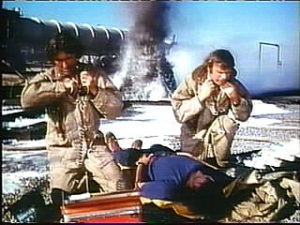I used to be a firefighter and EMT in years past. I still fondly remember those days and the 6 or so years I spent helping folks on their worst day and training to be ready to help them have given me some of the soft skills that have helped me through life as a technologist. Actually helped me through life as a Production DBA and now as a Consultant especially. One of the first things I ever put online in the SQL Server Community was this article on Troubleshooting tips I learned in that role here on SQL Server Central (5yrs ago if you want a good laugh…)
I’m going to talk about a broader picture here in two posts – A picture of soft skills I use as a SQL Server Consultant that I learned from my time in the back of an ambulance or dragging a hoseline through a burning building to put the wet stuff on the red stuff..
“It’s On Fire!!” (Perspective)
I was having dinner with a new client the other week and at this dinner he told me about his time as a Chaplain and firefighter on a Fire Department. We shared notes about the lessons we’ve brought to our IT world from the experience. This is one that came to the forefront of both of our minds. It’s important to remember that our day jobs are day jobs.Treat them with the importance they merit and give them the attention they deserve, and do our absolute best every day. We should always “bring it” and never phone it in. But – it’s also really easy as an IT worker to get trapped into a mindset that life needs to stop for work. That everything is the most critical project on the face of the earth and by critical – we mean really critical. Heck I’m still working on unpacking from that way of thinking at times when a client has a system down. And we need to be in that mode in the moment at times. But the morning after a really bad day in the ambulance – it’s hard to get that worked up and shaken to the core about a work issue being the most important thing in the world. That doesn’t mean we should be disaffected and unconcerned. But there is a perspective that comes from one night pumping on the chest of an 18 month old that was just run over for 30 minutes and being in the room when the medical team agrees to stop efforts, or from helping take a person out of their destroyed home a few weeks before Christmas knowing their next stop is the burn center.. That next morning after calls like that hearing “oh no! This customer can’t get into this app!” is important for sure, but it’s perhaps just a little bit less important. Work your issues like they are important, put your best effort in, but remember your world isn’t going to fall apart if the project hits a snag. Your family is still there, your health is still there, life will go on. The world isn’t ending if a restore has to take place.. The right response to “It’s on fire!!!” is “no it’s not… It’s bad but we can handle this..”
“This Is Not My Emergency”

One of the things you learn in fire and EMS and probably police work, well you better learn, is that the emergency you are being thrust into isn’t your emergency. It’s a saying you hear in training and critical incident stress debriefings from time to time. What is meant by that is simple and so vital – We got called into some ugly situations. Sure some people call 911 for a broken small toe (seriously…), but in general when they call they are having a bad day. Quite possibly the worst day of their life. It’s a bad situation and they are hoping we can do something to try and effect change. If we get caught up in the panic, if we internalize the emergency and freak out – we’ve just become totally useless to the task at hand. In IT – remember, when things go wrong (and they will.. they always will you should plan on it, as I blogged about awhile back) that it isn’t your emergency. Your world isn’t crashing down. And the worst thing that could happen to you isn’t that bad. We’re there to help someone else with their emergency and lean on our training and experience. As consultants we need to care, work our tails off and do what we can, but remember that it’s not our emergency.
“Be The Duck”
In one of my Paramedic text books there was a comment that said a good paramedic is like a duck – they look calm on the outside. On top of the water they are together and efficient. Under the water they are paddling kind of fast. It’s a good image and it mostly works. I talked about that attitude in my article on Troubleshooting I linked to above – but we need to have some of that attitude. As technologists and consultants, it doesn’t do any good to break out the scatter gun and run around looking to and fro every direction. We need to come up with a plan, project confidence and calmly move from item to item… I hate working with the folks who rapid fire scatter gun problems to death. They end up hitting everything but the real problem.
“If You Can Tell Me You Aren’t Breathing, You’re Breathing”
So this one kind of goes with Be The Duck above, but I wanted to talk about it separately. Even in these small towns I’ve worked in on the ambulance, I can’t tell you how many times I went to the “difficulty breathing” call and arrive to find someone having a full on panic attack and they will invariably say the same thing to you. Now back then I didn’t have kids yet so this was a new thing to hear to me.. It would be said in a panic stricken voice, “I CAN’T BREATHE! OH NO! I CAN’T BREATHE!!!!” Now when I first heard this I’ll admit, my stress level went up and I panicked a bit. That’s a big complaint and the person was obviously having trouble. But the more experienced person with me running that call back then spoke calmly but really firmly and said “Stop! Slow down! You are breathing. If you are talking to me you are breathing! The more panicked you get the harder it is!” It was said reassuringly but also firmly and strongly. The point was eventually heard and the breathing improved, slowed down and the Patient was in a better spot. We need to stop and breathe. When we think the world is imploding, it may be – but it probably isn’t – we should relax, focus on the basics and get calm and then move on and fix the real problem. We need to make sure that others aren’t freaking out also. (side note – one of the things an EMS textbook suggested is – for an amputation patient, it is best to find the limb, care for it appropriately and not place it in the view of the patient for transport to the hospital.. It’s good advice – we also don’t want to freak out the team and be the one instilling panic in others. The right response to “I can’t breathe!” isn’t “Oh no! This person is going to die! This person isn’t going to make it! DRIVE FASTER!!!!)
It’s simple stuff. It’s really just human being stuff that helps everywhere. I’ve said it many times before – but the soft skills matter. And when I engage with a SQL Server Consulting client, it’s the soft skills that often give me a longer term customer. Work on those and you’ll go far. Really work on them and you’ll go much further than I’ve gone.
See a few more lessons (Empathy, Knowing When to “Call It”, and listening to and believing “I’m going to die!”) in Part two here.
A few related posts that have something to do with a lesson I may have learned from time in the Fire/EMS Service:
- Checklists, Recipes and Algorithms – Lessons from Pilots, Chefs and Medical Professionals
- What’s Your Point? – Identifying the Chief Complaint and history taking
- Don’t Splint Your Database Server to Death – It happens. Focus on the basics is lost and a patient can have a non life threatening injury so well cared for with so much attention that they die of the not so obvious serious situation. DBAs do it all the time, too.


Great post, Mike! Your words remind me of two quotes.
The first is from my buddy & former MS engineer Ward Pond:
Don’t practice in front of the CIO.
—Pond’s 12th Law
http://blogs.technet.com/b/wardpond/archive/2009/10/26/the-pond-s-laws-home-page.aspx
That is, know your stuff, practice, before you’re confronted with an actual emergency.
The second is from Samuel Shem’s book on medical school, “House of God”:
The first thing to do in the event of a cardiac arrest is to take your own pulse.
In other words, as you say, “be the duck”.